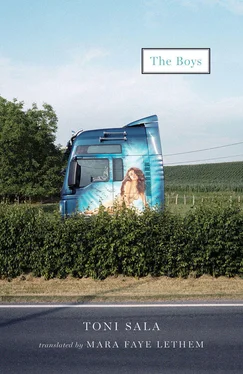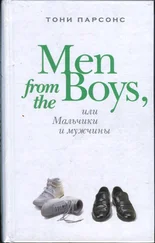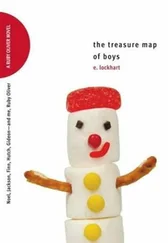Ernest went toward the car. Sometimes it seemed that men chose him. Even old ones, they looked back and said to him: Ah, when I was young! Ah, if I were young again! At the bank he was used to guys bragging about money, clients who puffed up their chests and looked at him arrogantly — he spends his days touching other people’s money, poor loser! — without imagining that in the very chair where they were then sitting, still warm, the last client had moved fifty or a hundred times more money than those braggarts, money that these show-offs couldn’t even imagine was flowing through Vidreres. But sexual vanity had an arrogance and a defiance to it that vanity over wealth didn’t. You can’t live without money, but you can live without sex, so these sexual creatures boast about something more gratuitous, more pure and free. And if it’s just their nature, then it’s even worse to brag. There was nothing to brag about then. They want to get you mixed up in their lies. He gave thanks for the success of his marriage, for the modesty of his desires, for the unequal distribution of things: how nature makes skinny gluttons and fat ascetics, and he was one of the former. He had always been like that, it wasn’t a question of age.
The trucker pointed with the flowers to a dent in the truck’s fender.
“I would have made mincemeat of that tree,” he said. “Get into the cab for a minute, come on, you’ll see how different it is than a car.”
He said no, but accepted a cigarette. He saw that the girl had left. He hadn’t smoked since his second daughter was born. Twenty years. Now, the sting made him feel the outline of his tongue, the walls of his mouth. He wanted to think it was his family and friends who helped him to be himself, but the two dead boys, the unhinged truck driver, the very taste of the tobacco was helping him much more. Otherwise, what were they doing there? What made him stop there? Now, after a delay, he thought he understood what had happened. Before the truck driver showed up he had the impression of his life being captured within walls of the dead, of feeling compressed by the death around him, the dead turning into his skin, his shape, his protection against a chaotic and ephemeral world; the cadavers converted into the only breakwater against the waves of time. The dead gave life shape: everything outside of Ernest was dead, the dead were dead, but the tree was also dead, and the truck driver was dead, and the prostitute was dead too. That was why he felt so bad and so alone, but also why he had to endure. If he went home and found his daughters and wife dead, he wouldn’t have lost an arm, or a lung: he would keep breathing, keep going to work at the bank every day. He would still be whole, even more whole then, with more experience. Ernest had a potbelly but was in good health. Why worry about the dent in the fender the trucker was pointing at? Why worry about the deaths of people he’d never met? Was suffering necessary? Or did he enjoy it? The trucker was right. We are idiots. How embarrassingly gratuitous suffering is, how contemptible. Keeping everyone who was dying at that moment present was an insult to the luck of not being in their skin. He didn’t suffer for the dead boys; he didn’t suffer for his daughters. He suffered for himself, for his cowardice, and he was eaten up by shame.
“What’s the dent from?” he asked.
“I don’t know. A couple of months ago I made a trip to Breda with construction materials. Because now you never know where you’ll get sent, any day I’ll have to go to Belgium or the ends of the earth, and that’s if I’m lucky. The fucking construction bust, it’s worse than they say, it’s all illegal trucks now, everybody’s a trucker now that there’s nothing to transport. So I had to go to Breda. It was already dark on the way back, I felt a jolt, but I didn’t stop. If it was a dog or a boar, it was dead. I glanced in the mirror and didn’t see anything on the road. Anyway, when an animal crosses the highway, the last thing you should do is try to dodge it, unless you want to have an accident. I don’t know what it was, maybe a ball. It wouldn’t have been the first time I’ve had an animal stuck to the fender, but when I got home there was nothing there. I know a trucker who once brought back a roe deer from the Pyrenees. He didn’t find it until the next day. He saw a stain on the ground, he thought his truck was losing oil, but it was a roe deer that was still breathing.”
The trucker climbed into the cab, put the flowers on the dashboard, lowered the window, and said, “Hop on in, you’ll see.”
“I’ve gotta go.”
“Look,” said the truck driver. “You can leave with a clear conscience. They’re coming to relieve us.”
At first he didn’t recognize him. Then he saw that it was Mr. Cals. He was walking with a cane that he’d never seen before. He looked mechanical, black and robust like a spider.
“You came to see the tree too?” said Mr. Cals.
He felt like a tourist at a concentration camp. Mr. Cals must have more reasons for being there. He lifted his cane and aimed it at a point amid the fields, with the mountains of the Ardenya in the background.
“Every day after lunch I stretch my legs, walking all the way to Clar stream,” he said. “You won’t find a flatter plain anywhere. . take a good look. Those trees over there are Puig’s forest. That’s Cal Borni. There, Can Batllosera. Do you see anything special?”
This eighty-year-old spider is voracious, thought Ernest, he’s very experienced, he rams in his chelicerae, waits for the poison to hit the insect he’s hunted, and then he eats it.
“The lands of Can Batlle,” said Ernest.
“Can Batlle is on the other side of town. No. These fields. . You see how flat they are? In 1937, during the war, they made an airfield here. Workers started to come, mostly from Sant Feliu, three hundred men showed up. Vidreres, in those days, was no more than two thousand, and that’s counting the two hundred war refugees from Madrid who’d already arrived. The clouds of dust they raised, moving all the earth, the tractors. . They still filled the trucks with shovels! They changed the course of Rere Pins and Can Canyet’s irrigation channel, they buried storehouses for bombs and gas tanks. . and in ’38, in March, it must have been about six, because we were coming out of school, we saw planes with four wings coming in from the west, and they landed, and they were still running along the strip when Ballartet, who was a kid like me, Ballartet lifted his finger to the sky, and we saw a silvery dot, like a needle. It was an observation plane — the kind we called Pava —from Franco’s forces, with three escort planes. The excitement didn’t last long. Within four days the first bombing began. Three planes at nine in the morning. A bomb fell where Can Met is now. Antoni Amargant and Pep from Casa Nova, who are dead now, were going to the village on bicycles, and when they heard the planes they threw themselves to the ground. And Pep was on the side closest to the road, and the shrapnel hit him and he lost an arm. Spent the rest of his life in Vidreres with one empty sleeve. Bombs fell where Can Rafel is now, breaking all the windowpanes, and on one of Torre’s fields, on Modeguet and Can Castelló; it’s a miracle they didn’t kill Encarna Mauri. It was a bad spot for an airfield, one of those ideas the Republic had, putting a field here just because it was flat. The National forces came from Majorca, and when they passed Mont Barbat they were right over us. . There was no time to do anything: when you heard the roar of the engines the bombs had already started. Five days later, a couple more planes attacked us. I remember that it hadn’t rained in a long time, and the earth was so dry that the bombs sent chunks flying higher than the tops of the pine and cork trees, so much dust, and a bomb fell on the woodshed of Can Súria, everybody was in the shelter except for Genové and Miquel Vives from Sils, who were working in the field, and both got killed.” Mr. Cals grabbed Ernest by the arm. “First thing the next morning they attacked the field again, because it was April 14, the anniversary of the Republic. I was headed to school. I saw the middle of the field all lit up. . and the planes ran along the strip so they wouldn’t get hit — the lights were bombs. . Ambulances ran all morning. They blew up the gas tank at the Campsa, they killed three pilots and a lieutenant, four dead. .”
Читать дальше












